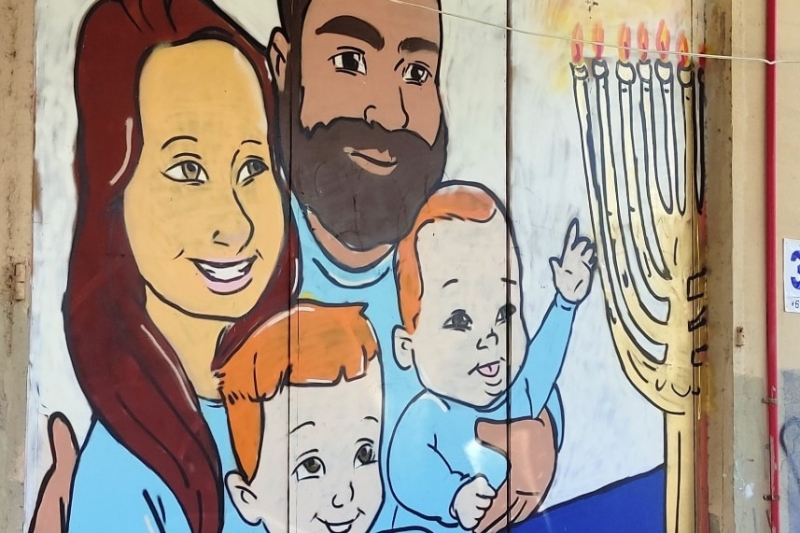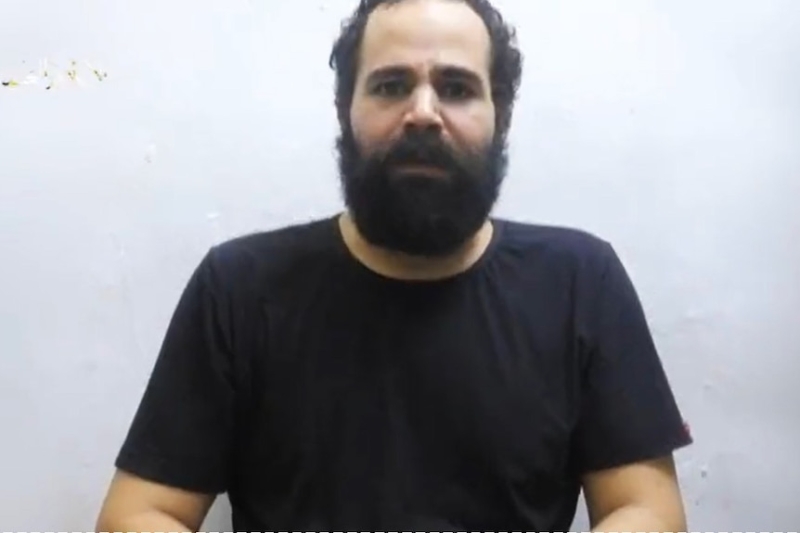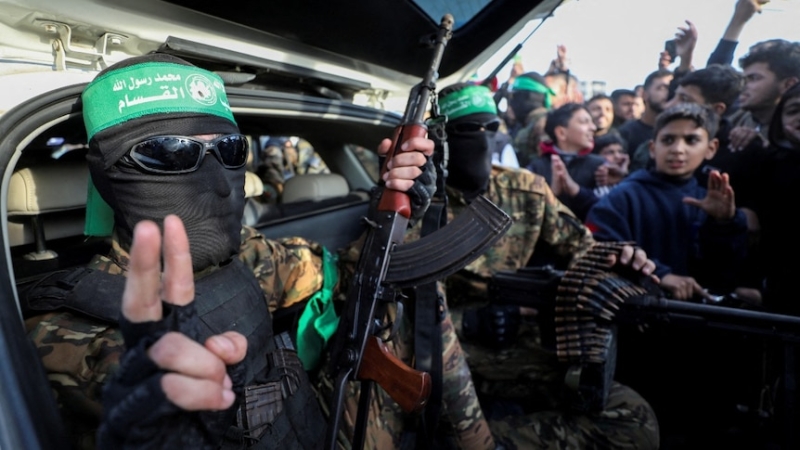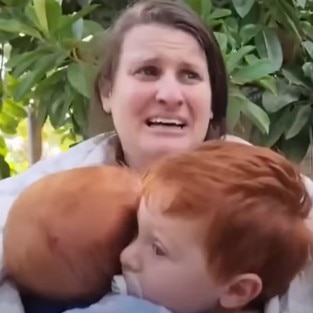Hamas says hostages Shiri Bibas and her children Kfir and Ariel are dead, but many Israelis do not believe that. (Supplied: Telegram)
The video was gut-wrenching: a mother, terrified and confused, cradling her two young red-headed children as armed militants surround them.
It was the moment they were kidnapped. By the time it was released, Shiri Bibas and her sons were already in Gaza.
It's been estimated more than 250 hostages were taken as part of Hamas's October 7, 2023 attack on Israel. The Bibas family is among the most high-profile.
They're due to be released as part of the delicate and complex multi-phase ceasefire deal signed this month.
Whether they're alive depends on who you talk to. If they're not, it's likely to unleash unbridled fury and sadness in Israel, where the family has become a symbol of the country's darkest day.
"This is an ongoing nightmare," Yifat Zailer, Shiri's cousin, told the ABC.
"Until now, until today, no organisation, not the Red Cross, not UNICEF, not the Israeli intelligence, can tell us what their situation is."

The Bibas family has become a symbol of Israel's darkest day. (Supplied: Nizzan Cohen)
Images of baby Kfir Bibas, who was just eight months old when he was abducted, and his brother Ariel, who was four, adorn murals and posters around the country.
They were the youngest hostages taken and the video made headlines around the world.
The children are believed to have been held with their mother, while their father, Yarden, was also kidnapped, but kept elsewhere.
Over the past 15 months, Hamas has filmed and released videos of some of the hostages saying how difficult their situation is and asking Israeli Prime Minister Binyamin Netanyahu for a ceasefire deal and hostage-prisoner exchange.
In November 2023, Hamas published a video of Yarden Bibas being told his wife and children had been killed. Hamas said they were killed in an IDF air strike on Khan Younis, in southern Gaza.
Yarden broke down crying in the video. He is now among 11 male hostages under the age of 50 who are being released because they are physically or psychologically infirm. But it is not known for sure that any of them are still alive.

Hamas released a video of hostage Yarden Bibas, but it's not known if he is still alive. (Supplied: Telegram)
Ninety-four hostages remain in the Gaza Strip, including 91 taken as part of the 2023 attack and three captured earlier. The fate of many is unclear.
Hamas claimed it tried to release Shiri, Kfar and Ariel's bodies as part of the first ceasefire at the end of 2023, but that Israel wouldn't accept them. But it has not released videos or pictures of Shiri and her children either alive or dead.
"I don't know whether I need to buy them clothes because they don't have anything left here, their house is completely destroyed," Yifat said.
"The uncertainty is completely paralysing."
Israel's government has said it does not know the family's fate and has warned that Hamas's announcements could be psychological warfare. Israeli authorities believe at least half of the 94 hostages in Gaza are alive.
A total of 33 hostages are expected to be released by Hamas as part of phase one of the ceasefire agreement in exchange for hundreds of Palestinians, who are either convicted prisoners or administrative detainees whom Israel has imprisoned without charges or trial.
"These weeks are moving very, very slowly and we hope for the best. We hope to see them, to hug them, to feel them, and to rehabilitate them from this nightmare," Yifat said.
"All four of them."
Hamas freed three living Israeli women last weekend, and announced it would release another four women on Saturday. That means neither the Bibas children nor the father will be released — so likely, not the mother, either.
Yifat and the Bibas family's other relatives are trying to stay positive.
"We are trying to hold onto hope and think in the most positive way. But from week to week, from release to release, when we don't know if they are the next ones in line [to be released] or not it becomes harder and harder," she said.
According to the ceasefire agreement, the day before the transfers, both sides must release the names of the people they will be releasing.
There have been reports in Hebrew media that on Friday, local time, Hamas will provide the names of the four women, along with another list detailing the health status of the other hostages expected to be released in the first phase of the deal.
Hamas has made one thing clear this week: It's still the boss in Gaza
Photo shows Hamas militants

The Bibas family relatives are not alone in their fears over the fate of their loved ones.
"While we are filled with joy for the four hostages scheduled to be released, knowing that they will be reunited with their families, we simultaneously face the terrifying possibility of learning that some of our loved ones might not be alive," a statement from Israel's Hostage and Missing Families Forum read.
The group has been representing people captured and harmed as part of Hamas's October 7 attack.
Some hostages are known to have been killed later by the Israeli military bombardment, three were mistakenly shot dead by Israeli soldiers, and six are believed to have been killed by their Hamas guards when Israeli soldiers came near.
Many Israelis are sceptical of Hamas's claims that Shiri, Kfar and Ariel Bibas are among the dead.
That tragic question will soon be answered, if and when they are released.
What's less clear, is how ready Israelis are for the worst.

